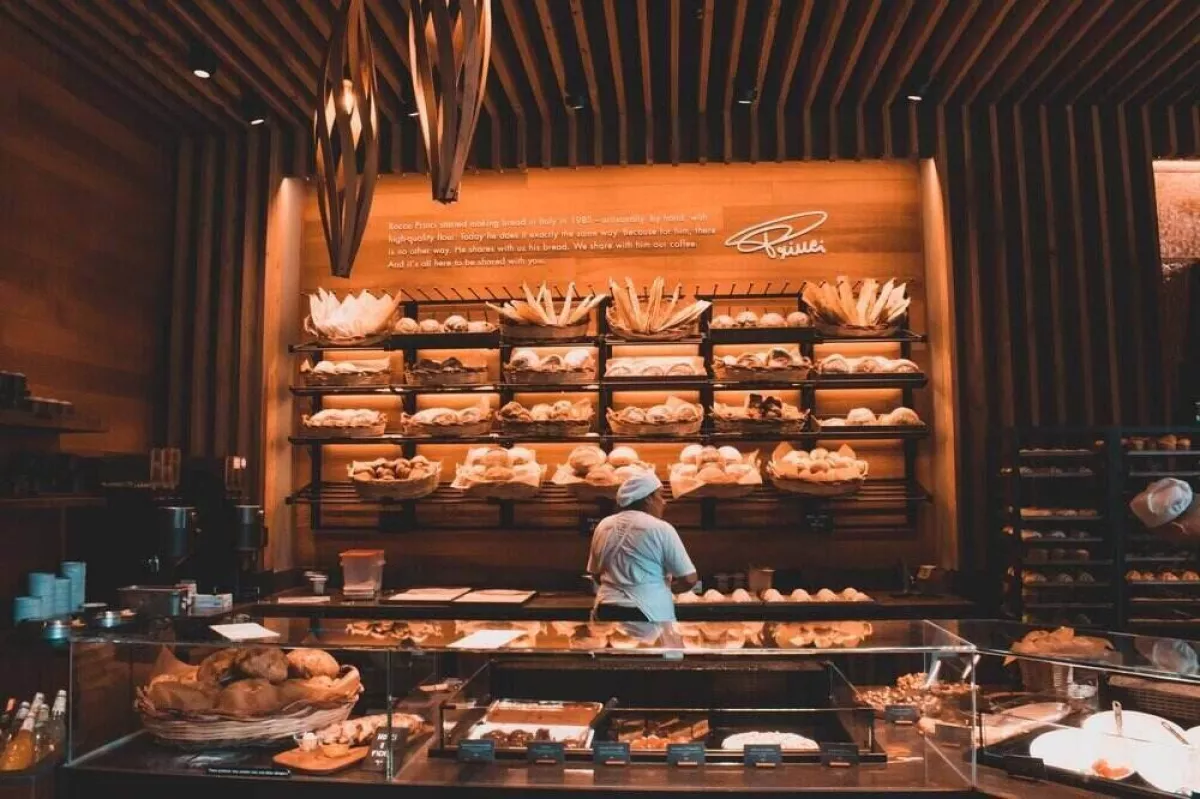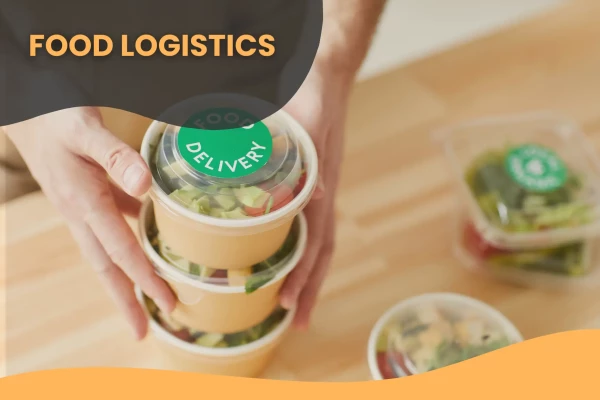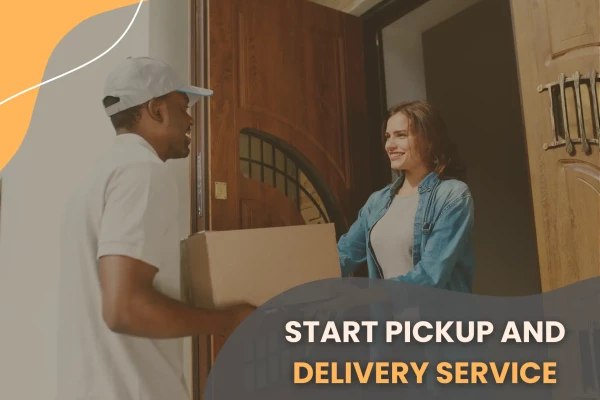Bakery Transport Issues Can Be a Piece of Cake with the Right Tech

by
Yulia Miashkova
May 28, 2021
When it comes to food production and food businesses, transport issues can be many and overwhelming. This applies to bakeries as much as any other HoReCa business, and perhaps even more in some situations.
No customer wants to bite into a stale croissant or a bad crumpet. Baked goods – whether bought at a mall, ordered from a gourmet patisserie, or delivered for a party or event – have to remain fresh to be enjoyable.
This is getting more and more difficult to ensure, of course, with food provision moving beyond traditional counter sales. In other words, consumers no longer come into shops for their baked goods, and bakeries need to offer their products across different channels. This makes delivery and transportation important for bakeries.
Read on to learn more about the importance of efficient transportation for bakeries, and bakery transportation issues and how to solve them.
The importance of efficient transportation for bakeries
As we’ve already discussed, good quality and freshness are necessary criteria for baked products. Of course, these are only some of the things bakeries need to consider when deciding on the best forms of transportation for their business.
Efficient transportation enables you to meet high standards. With the right kind of transportation system, you can ensure that your products remain edible and delivered in time (more on the importance of time and spoilage later on). There are also specific conditions that different baked goods need to remain in, for example, warm or cold temperatures, which you need to consider with the transportation system you choose.
Transportation efficiency also impacts your business costs, the number of goods you can deliver at a time, sanitation of your food during the delivery, and the state of the food.
Many of the points above relate to the products and their condition during and post-delivery. However, you also have your customers to consider. Whether you’re delivering to a store or kiosk for which you are a supplier or directly to the customer or client, you need to make sure you give them exactly what they ordered.
Customer satisfaction becomes more and more important every day, and delivery now plays a central role in maintaining this satisfaction and providing the best service. With technological developments and changes in how people consume food and make their purchases, food manufacturers and retailers have to understand consumer trends and demands to adjust accordingly.
Particularly with the shift in sales perspectives during the COVID-19 pandemic and the consequent lockdowns, customers now expect the best-delivered bites at their door. And if bakeries want to keep their business, then they need to prioritize brilliant delivery options that bring that fresh bakery smell right to their customers’ doorsteps.
Some of the transportation issues faced by bakeries are also the reasons why fantastic bakery delivery systems are important.
7 delivery/transport issues faced by bakeries
Below are some of the most common problems faced by bakeries. Understanding these issues will make it clear that efficient delivery systems are an absolute necessity.
1. Sustaining freshness and food quality
Maintaining product freshness is about monitoring times and managing the delivery of goods within stipulated deadlines. For bakery deliveries, time limitations tend to vary, influenced by the product type, consumption date, and sell-by date of the goods. Your competitive advantage as a business rises when you’re able to deliver fresh products. Thus, you are faced with a major transport issue and demand: the pressure to sustain freshness and food quality.

2. MABDs and retailer commitments
Speaking of deadlines, the food quality deadline isn’t the only time constraint that your organization faces. You also need to ensure your client or customer receives their order when they expect it. These delivery dates are also known as Must Arrive by Dates (MABDs) or estimated time of arrival (ETA).
When retailers fail to meet these commitments they can incur fees, particularly if it is a relationship in which the bakery is a supplier. However, the cost is not just financial as failure to meet commitments can spoil buyer and/or customer relationships and harm your business’ brand and reputation.
3. Slow food data collection
Linked to time-tracking and knowing the conditions that your products need is the issue of food data collection. It is important for your company and your delivery team and personnel to know what baked products are being delivered, what conditions they need to be kept in, and any other relevant data.
When this data is not collected on time, then it becomes difficult to implement strategies that alleviate freshness-related transport issues.
Furthermore, data collection is important for monitoring time limits. Bread, cakes, and other baked goods have very limited shelf lives, leaving very little time for mistakes and delays. Knowing when these goods were produced gives a clear margin for when they need to be on the shelf or in the customer’s hands.
4. Temperature control
Also important for the delivery of fresh baked goods is the temperature at which you transport the food. Some goodies require warm temperatures, while others need colder environments. Whatever the situation, temperature poses a very huge transport issue that can severely detriment the quality and the viability of products for sale.
5. Handling
When dealing with delicate pastries and any food really, handling becomes a transport issue.
The state of the vehicle, and how your workers handle the food, all need clear assessment. If vehicles or trailers are filthy or full of debris, dirt, and odors, and employees throw the packages about or handle them with dirty hands, it compromises the quality of the goods. Not only do you want to make sure the food meets health and sanitation standards, but you also want to ensure that it arrives at its destination undamaged.
6. Vehicle type
Does your vehicle have refrigeration or temperature control? Will it be able to take the required quantity of product to the customer? Is the vehicle safe for delicate goods?
The kind of vehicle you use is a transport issue that you ought to consider when you purchase it to make sure that it meets all the needs of a bakery delivery system. Having the right kind of vehicle will also help you alleviate some of the other transport issues on this list like temperature control.

7. Costs
Bakeries will face standard costs faced by any delivery, logistics, or transportation system including fuel and oil prices, labor, inflation, vehicle maintenance, and more. However, some costs are unique to food delivery or more specifically to bakery delivery.
First is the cost of installing and maintaining refrigeration and/or temperature control technology in the vehicle.
The second is the cost incurred by the organization in case of delivery delays. Late deliveries lead to late fees, as per transport issue #2 and they can result in food waste if the order is no longer fresh enough or good enough for the customer to consume. Furthermore, if the business makes a late delivery that is then rejected by the customer because of poor quality, money spent on making that delivery is lost, too.
How to solve delivery/transport issues
There are many different solutions and approaches your business can utilize to deal with the above transport issues. Some, like handling and sanitation protocol, have to do with your organizational culture and employee training. Others can be addressed on a case-by-case basis as causes of transport issues or any other problems do not remain stagnant.
However, there is a way to address a number of these transport issues without breaking the bank or redirecting resources: Track-POD’s amazing transport management solutions.
Route planning & optimization
Route planning and optimization features can help you get the best out of your delivery trips, maximizing time and money, and ensuring deliveries arrive fresh and right on time. With route planning and optimization, you can plan shorter and faster routes.
Plus, Track-POD’s software automates processes, considering factors like order size, volume, vehicle availability, relevant times, etc. It also does the job of allocating routes to drivers automatically.
Transport issues addressed: time, freshness, meeting orders, vehicle allocation.
GPS tracking
With the GPS tracking feature, bakery managers or delivery managers can track the progress of the delivery in real-time, providing more accurate arrival estimates for customers. Furthermore, route planning combined with GPS estimates can enable better time planning so that orders arrive on time.
The navigation capabilities also help prevent drivers from getting lost or encountering any on-the-road delays by providing updated routes in real-time.
Transport issues addressed: time, accurate ETAs/MABDs.
Delivery app
Drivers can access job notifications, planned routes, and navigation through the delivery app. This makes it easier for them to familiarize themselves with the routes beforehand, making it less likely that they get lost or delay the delivery.
The app also enables communication between drivers, managers, and customers. This is important for any updates about possible delays and instant information updates about the trip.
Transport issues addressed: time, freshness, accurate ETAs/MABDs, vehicle allocation.
Cloud-based database
On the app, the driver and manager can access a cloud-based database with documents and relevant data for trips. This database updates in real-time which eliminates transport issues caused by the slow data flow.
Plus, you can then share documents like Proof of Delivery directly with the client! Your business can also consider uploading handling instructions onto the database for delivery drivers to access and make reference to whenever they might need it.
Transport issues addressed: time, freshness, accurate ETAs/MABDs, data collection, handling.
API integration
Another important feature to address bakery transport issues is the API integration offered across Track-POD’s solutions. The integration capability allows you to connect additional, vital software solutions to the Track-POD system.
For example, you can connect your order management facility or your inventory management solutions. Doing so allows you to access and manage different elements of your delivery in one place. It also supports the automation features, allowing Track-POD to automatically assign orders as they come in.
Having the order information also means gaining access to important details like required temperature levels, handling, MABDs, and so on. With this data, you and your Track-POD solution can plan the best delivery possible.
Transport issues addressed: meeting orders, accurate ETAs/MBDAs, data collection, vehicle allocation, handling.
Vehicle management

Finally, but certainly not the least important (we are discussing transportation issues after all), is the mode of transport itself. The vehicle is central to getting the product where it needs to be, of course. Track-POD solutions boost your vehicle management on two levels.
First, the vehicle check and safety management platform helps you monitor the maintenance and well-being of your fleet. You cannot assure good delivery without ensuring your vehicles remain roadworthy. Of course, for bakeries, this also includes the maintenance of unique temperature and refrigeration systems.
The software solution allows workers to record any vehicle defects, supports vehicle inspections (even before each route if necessary), stores complete inspection data, and tracks defects to make sure they get addressed.
The second transport issue the Track-POD solution can assist with is selecting the right vehicle type for a trip. The transport management system will consider the volume, load capacity, and weight of the vehicles in your fleet. It will then divide and allocate deliveries accordingly.
Transport issues addressed: vehicle allocation, handling.
Conclusion
Everybody has a baked favorite that they would die to have while it’s fresh and absolutely delicious to nibble on. That is the demand that bakeries thrive on. Transport issues can get in the way of this, ruining your food quality, delaying deliveries, and increasing costs. All of these things have direct consequences on customer satisfaction and the success of your business.
It might seem like a not-so-important cost for a bakery but the right delivery software can help make sure you do your products justice, reduce your transport issues, and get your cookies to your customers just the way they like them.
- Last Mile Delivery
- Transportation management
About The Author
Yulia Miashkova
Growth marketing manager with a background in public relations, SEO, social listening, and Account-Based Marketing.








